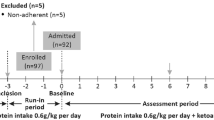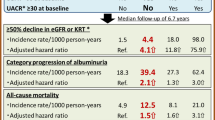Abstract
Background
Type 2 diabetic kidney disease (DKD) is the most common cause of end-stage renal failure, and the prevention of its progression has been a topic of discussion.
Methods
Sixty type 2 DKD patients were retrospectively evaluated for 1 year. Factors independently affecting the annual Ccr decline were examined by multivariable linear regression analysis. Patients were further divided into 2 groups based on their degree of renal function, and between-group differences at study initiation were evaluated.
Results
Ccr values were 21.0 ± 11.8 mL/min/1.73 m2 at study initiation, and 15.7 ± 10.9 mL/min/1.73 m2 after 1 year of observation. The multivariable linear regression analysis indicated salt intake (standardized coefficient: −0.34, P = 0.010) and urinary protein excretion (standardized coefficient: −0.33, P = 0.011) to be factors independently affecting the annual Ccr decline. Although decliners (−9.8 ± 4.7 mL/min/1.73 m2/year) had a significantly higher salt intake than non-decliners (−1.1 ± 3.8 mL/min/1.73 m2/year) at study initiation, this difference disappeared at the end of the study as a result of intensive dietary education. In 21 decliners with an additional year of follow-up, the annual Ccr decline significantly improved from −10.1 ± 5.3 to −5.3 ± 7.4 mL/min/1.73 m2/year (P = 0.02).
Conclusion
Salt intake and urinary protein excretion were associated with annual Ccr decline in type 2 DKD patients. Furthermore, dietary education covering salt intake may have positively affected the change in Ccr.

Similar content being viewed by others
References
Rotz E, Rychlik I, Locatelli F, Halimi S. End stage renal failure in type 2 diabetes: a medical catastrophe of world wide dimensions. Am J Kidney Dis. 1999;34:795–808.
Byme C, Steenkamp R, Castledine C, Ansell D, Feehally J. UK renal registry 12th annual report: chapter 4: UK ESRD prevalent rates in 2008: national and centre-specific analysis. Nephron Clin Pract. 2010;115(Suppl 1):c41–67.
Nakai S, Iseki K, Itami N, Ogata S, Kazama JJ, Kimata N, et al. An overview of regular dialysis treatment in Japan. Ther Apher Dial. 2012;16:483–521.
Gall MA, Nielsen FS, Smidt UM, Parving HH. The course of kidney function in type 2 (non-insulin-dependent) diabetic patients with diabetic nephropathy. Diabetologia. 1993;36:1071–8.
American Diabetes Association. Standards of medical care in diabetes-2011. Diabetes Care. 2011;34(Suppl 1):S11–61.
Rossing K, Christensen PK, Hovind P, Tarnow L, Rossing P, Parving HH. Progression of nephropathy in type 2 diabetic patients. Kidney Int. 2004;66:1596–605.
Unsal A, Koc Y, Basturk T, Akgun AO, Sakaci T, Ahbap E. Risk factors for progression of renal disease in patient with diabetic nephropathy. Eur Rev Med Pharmacol Sci. 2012;16:878–83.
Zoppini G, Targher G, Chonchol M, Ortalda V, Negri C, Stoico V, Bonora E. Predicted of estimated GFR decline in patients with type 2 diabetes and preserved kidney function. Clin J Am Soc Nephrol. 2012;7:401–8.
Altemtam N, Russell J, Nahas ME. A study of the natural history of diabetic kidney disease (DKD). Nephrol Dial Transplant. 2012;27:1847–54.
Suckling RJ, He FJ, Macgregor GA. Alterd dietary salt intake for preventing and treating diabetic kidney disease. Cochrane Database Syst Rev. 2010;8:CD006763. doi:10. 1002/14651858. CD006763.pub2.
Maroni BJ, Steinman TI, Mitch WE. A method for estimating nitrogen intake of patients with chronic renal failure. Kidney Int. 1985;27:58–65.
Japan Nephrology Society. Special issue. Clinical practice guidebook for diagnosis and treatment of chronic kidney disease 2012. Nihon Jinzo Gakkai Shi. 2012;54:1034–191.
Maeda CY, Schaan BD, Oliveira E, Oliveira V, De Angelis KD, Irigoyen MC. Chronic salt loading and cardiovascular-associated changes in experimental diabetes in rats. Clin Exp Pharmacol Physiol. 2007;34:574–80.
Keane WF, Brenner BM, de Zeeuw D, Grunfeld JP, Mcgrill J, Mitch WE, Ribeiro AB, Shahinfar S, Simpson RL, Snapinn SM, Toto R. The risk of developing end-stage renal disease in patients with type 2 diabetes and nephropathy: The RENAAL Study. Kidney Int. 2003;63:1499–507.
Rossing K, Christensen PK, Hovind P, Tarnow L, Rossing P, Parving HH. Progression of nephropathy in type 2 diabetic patients. Kidney Int. 2004;66:1596–605.
Remuzzi G, Bertani T. Is glomerulosclerosis a consequence of altered glomerular permeability to macromolecules? Kidney Int. 1990;38:384–94.
Mancia G, De Backer G, Dominiczak A, Cifkova R, Fagard R, Germano G, Grassi G, Heagerty AM, Kjeldsen SE, Laurent S, Narkiewicz K, Ruilope L, Rynkiewicz A, Schmieder RE, Struijker Boudier HA, Zanchetti A. Guidelines for the management of arterial hypertension: the task force for the management of arterial hypertension of the European Society of Hypertension (ESH) and of the European Society of Cardiology (ESC). J Hypertens. 2007;2007(25):1105–87.
Hayashi K, Wakino S, Sugano N, Ozawa Y, Homma K, Saruta T. Ca2+ channel subtypes and pharmacology in the kidney. Circ Res. 2007;100:342–53.
Kobori H, Mori H, Masaki T, Nishiyama A. Angiotensin II blockade and renal protection. Curr Pharm Des. 2013;19:3033–42.
Matsuo S, Imai E, Horio M, Yasuda Y, Tomita K, Nitta K, Yamagata K, Tomino Y, Yokoyama H, Hishida A. Revised equations for estimated GFR from serum creatinine in Japan. Am J Kidney Dis. 2009;53:982–92.
Diamandopoulos A, Goudas P, Arvanitis A. Comparison of estimated creatinine clearance among five formulae (Cockroft–Gault, Jelliffe, Sanaka, simplified 4-variable MDRD and DAF) and the 24 h-urine-collection creatinine clearance. Hippokratia. 2010;14:98–104.
Dowling TC, Wang ES, Ferrucci L, Sorkin JD. Glomerular filtration rate equations overestimate creatinine clearance in older individuals enrolled in the Baltimore Longitudinal Study on aging: impact on renal drug dosing. Pharmacotherapy. 2013;33:912–21.
Dowling TC, Matzke GR, Murphy JE, Burckart GL. Evaluation of renal drug dosing: prescribing information and clinical pharmacist approaches. Pharmacology. 2010;30:776–86.
Pedrini MT, Levey AS, Lau J, Chalmers TC, Wang PH. The effect of dietary protein restriction on the progression of diabetic and nondiabetic renal disease: a meta-analysis. Ann Intern Med. 1996;124:627–32.
Koya D, Haneda M, Inomata S, Suzuki Y, Suzuki D, Makino H, Shikata K, Murakami Y, Tomino Y, Yamada K, Araki SI, Kashiwagi A, Kikkawa R. Low-protein diet study group. Long-term effect of modification of dietary protein intake on the progression of diabetic nephropathy: a randomized controlled trial. Diabetologia. 2009;52:2037–45.
Williams ME, Stanton R. Chapter 31-nutritional and metabolic management of the diabetic patients with chronic kidney disease and chronic renal failure. In: Kopple JD, Massry SG, Kalantar-Zadeh K, editors. Nutritional management of renal disease. 1st ed. Amsterdam: Elsevier; 2013. p. 485–502.
Conflict of interest
The authors have declared that no conflict of interest exists.
Author information
Authors and Affiliations
Corresponding author
About this article
Cite this article
Kanauchi, N., Ookawara, S., Ito, K. et al. Factors affecting the progression of renal dysfunction and the importance of salt restriction in patients with type 2 diabetic kidney disease. Clin Exp Nephrol 19, 1120–1126 (2015). https://doi.org/10.1007/s10157-015-1118-y
Received:
Accepted:
Published:
Issue Date:
DOI: https://doi.org/10.1007/s10157-015-1118-y




